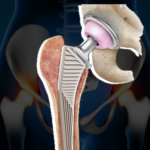
Advancements in medical technology have led to various materials being used for knee replacements, offering patients improved mobility and enhanced quality of life. Among these materials, gold knee replacements have gained attention for their unique properties. Dr. Saurabh Giri, a renowned orthopedic surgeon, has been at the forefront of advocating for innovative approaches in knee replacement surgeries, including the utilization of gold implants. In this comprehensive analysis, we’ll delve into the comparison between gold knee replacements and other implant materials to understand their benefits, drawbacks, and suitability for patients.
Understanding Knee Replacement Implant Materials:
Gold Knee Replacements:
Gold implants have been introduced as a potential alternative to conventional materials like titanium or cobalt-chromium. Gold offers excellent biocompatibility, reducing the risk of adverse reactions or allergic responses in patients. Additionally, its malleability allows for customization, enabling surgeons like Dr. Saurabh Giri to tailor implants to fit patients’ unique anatomies. However, gold implants are not as widely used due to their higher cost and the availability of other durable materials.
Titanium:
Titanium is a popular choice for knee replacements due to its strength, corrosion resistance, and compatibility with the human body. It is lightweight and exhibits excellent durability, making it suitable for long-term use. Its biocompatibility ensures minimal allergic reactions, and its ability to bond with bone promotes osseointegration, enhancing implant stability. Titanium implants are widely accepted and commonly used in orthopedic surgeries.
Cobalt-Chromium:
Cobalt-chromium alloys are known for their strength and wear resistance, making them a standard choice for knee replacements. These alloys provide durability and stability, reducing the risk of implant failure. However, some patients may experience allergic reactions or sensitivities to certain components of cobalt-chromium implants, limiting their use in specific cases.
Comparative Analysis:
Biocompatibility:
Gold knee replacements exhibit exceptional biocompatibility, reducing the risk of adverse reactions. Titanium also boasts high biocompatibility, promoting osseointegration and long-term stability. Cobalt-chromium implants may pose allergic risks for some patients, although they are generally considered biocompatible.
Durability and Strength:
Titanium and cobalt-chromium implants are renowned for their durability and strength, withstanding the demands of daily activities. Gold implants, while malleable and customizable, might not offer the same level of strength as titanium or cobalt-chromium, potentially impacting their long-term durability.
Cost Considerations:
Gold knee replacements are often more expensive than titanium or cobalt-chromium implants due to the material’s scarcity and manufacturing processes. This higher cost might limit accessibility for some patients. Titanium implants are relatively cost-effective and widely available, while cobalt-chromium falls within a similar cost range but may vary based on the specific alloys used.
Customization and Adaptability:
Gold implants stand out for their malleability, allowing surgeons like Dr. Saurabh Giri to customize implants to better match patients’ anatomies. This customization potential might offer better fits and potentially improve patient outcomes. Titanium and cobalt-chromium implants also offer some level of customization but to a lesser extent compared to gold.
Conclusion:
In conclusion, while gold knee replacements present unique advantages in terms of biocompatibility and customization, their higher cost and potential limitations in strength compared to titanium and cobalt-chromium alloys might hinder their widespread adoption. Titanium remains a popular choice due to its excellent properties, including strength, biocompatibility, and affordability. Cobalt-chromium, despite its strength, may pose concerns regarding allergic reactions in certain individuals.
Ultimately, the choice of implant material in knee replacement surgeries should be made in consultation with experienced orthopedic surgeons like Dr. Saurabh Giri, considering individual patient factors, preferences, and medical needs to achieve the best possible outcomes.
Dr. Saurabh Giri’s advocacy for innovative approaches, including the utilization of gold knee replacements, highlights the importance of exploring various options in orthopedic surgery to continually improve patient care and outcomes.




